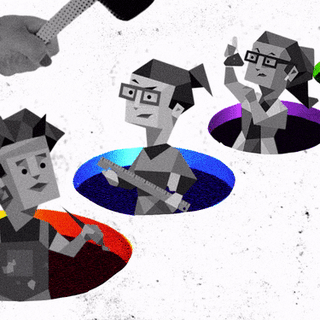
How Abusers ‘Love Bomb’ People to Manipulate Them Into Relationships
Part of the cycle of abuse, love-bombing occurs when an abuser attempts to influence others by overwhelming them with attention, affection.

Simon Leviev, the subject of the true crime documentary, The Tinder Swindler, often employed a compelling tactic to manipulate women into committed relationships rather soon after meeting them. He would shower them with praise, compliments, affection, and big grand gestures. Soon after, however, as the viewers witnessed, Leviev would run away with their money even as they would make excuses for him — holding on to the image of the man who treated them with so much care and affection from the moment they first met. There’s a name for this tactic: it’s called “love bombing,” and it is far too common in the modern dating realm. Evidently, as a manipulation technique, it can be rather potent, too.
“[It] is a tactic of flooding a new partner with an overabundance of attention, compliments, and often false promises,” explains Carla Marie Manly, a clinical psychologist. “Although the person [at the receiving end] thinks the love-bombing is real and a sign of devotion and love, the love-bomber engages in ‘loving’ behaviors for personal gratification and self-inflation.”
The move is meant to trick people into actually believing that they’re “the one” for their love bomber. As Sasha Jackson, a therapist, told Cosmopolitan, “You feel special, needed, loved, valuable, and worthy, which are all the components that contribute to and increase a person’s self-esteem.” Jackson explains that being showered with attention and validation thus can boost our dopamine and endorphins — helping us feel good, and signaling safety.
In the process, love bombing often gets mistaken for the whirlwind romances we’ve seen playing out in pop culture. After all, staying constantly in touch — be it through texts, emails, calls, or social media — after just one date can seem like the beginning of a passionate romance novel, right? Blasting through all the relationship milestones at breakneck speed, too — just like the protagonists of Wedding Daze — can seem romantic. So can the barrage of flowers and chocolates. And amid the chronic loneliness epidemic that is slowly — but steadily — taking over, someone taking an active interest in our background, aspirations, hobbies, interests, and deepest, darkest thoughts, seems like a scene right out of the Before trilogy.
“It’s very exaggerated, histrionic, but could also be seen as deeply seductive and romantic,” Chitra Raghavan, a professor of psychology at John Jay College of Criminal Justice, told The New York Times.
Related on The Swaddle:
Why Ghosting Is Not Always a Form of ‘Emotional Abuse’
Sure, these things can just as easily appear clingy, too. But, far too many times, they don’t. At a time when we’re constantly being told how emotional unavailability is on the rise, the fact that someone we’re attracted to is spending every minute of their waking life on us might make one feel like they’ve won a jackpot in the department of love. “[O]ur culture, through TV, films, and fairy tales, tells us that the behavior we know as love bombing is a normal expectation of romantic love,” says Laura Reagan, a trauma therapist.
Raghavan provides a ready reckoner, too, “If someone pays you attention and is generally present during the first date, that generally signals interest… But then there’s also someone that pays you interest in such a way that you’re consumed by it.” The latter, of course, could be the tell-tale signs of a love bomber.
“If the person seems to be madly in love with you days or weeks after you meet for the first time, or if you find yourself wondering how they could possibly feel so strongly about you when they don’t know you very well, that’s a red flag,” suggests Reagan. “In abusive relationships, there is often a brief, intense courtship period followed by a desire to quickly formalize and deepen the commitment.”
This isn’t to say that everyone who tends to come on too strong is necessarily love bombing — it could simply be a misunderstanding, it could be a case of everyone involved being a tad more impulsive than the norm, too, or two people might genuinely be so besotted that they, in that moment, don’t know any better. “Sometimes people are well-intentioned and just very expressive in their affection, or maybe they have codependent tendencies, which drive them to want to spend ample amounts of time with a new love interest,” explains Elena Welsh, a clinical psychologist.
But the controlling behavior doesn’t just show up at the beginning of relationships — in fact, love bombing plays an integral part in the emotional attachment survivors of abuse often form with their abusers. Called trauma bonding, the attachment forms as a result of repeated cycles of devaluation of one’s self-worth, abuse, and a dose of positive reinforcement. Love bombing is that positive reinforcement. “If [the survivors] do manage to break free, all the [abuser] has to do is go back to that courtship phase to win them back,” Sherry Gaba, a psychotherapist, wrote in Psychology Today.
Here, biology plays a role too. When the negative behavior is followed by “intermittent reinforcements of kindness and love,” a cortisol-dopamine cycle kicks in. And so, amid the high levels of cortisol (the “stress hormone”) within the relationship, the survivor unconsciously craves dopamine (the “happy hormone”), which the reinforcements bring — making this a vicious cycle. “It’s like taking a drug: when you take it, you experience a high; when you don’t, you feel low — but you’re always craving that high,” Samriti Makkar Midha, a Mumbai-based psychotherapist, had told The Swaddle in 2021.
Related on The Swaddle:
Many Indian Families Express Care Through ‘Bullying,’ Creating Patterns of Abuse
Naturally, it can be difficult to pick up on the subtleties of love bombing — especially so, since it might seem “normal.” After all, during the “honeymoon phase” of any relationship, emotions are often intense, excitement and arousal always on the upswing, gifts aplenty, and altercations almost non-existent. What sets it apart from love bombing, though, is that the honeymoon phase wears off over time; love bombing, however, can be interspersed with periods of possessiveness and anger — both, just as extreme as the over-the-top displays of love. “Although there may be a slight change in behavior as the ‘honeymoon phase’ ends, it will not be as dramatic as the abrupt change that typically follows love bombing,” Welsh notes.
In fact, one’s reaction to being told they’re coming on too strong can actually hint towards love bombing: “a healthy person will say, ‘No problem, I can back off, I want you to feel comfortable, [but a] dysfunctional love bomber will gaslight you and make it your problem,” states Lia Huynh, a relationship therapist. The gaslighting can be in the form of a love bomber responding to the accusation of being clingy, saying, “I can’t help that you’re the only thing on my mind since we met… I’m sorry I’m not as cold and unemotional as you.” Or, they might say they only want to know their love interest’s whereabouts because they “care,” and are aggressively doling out career advice to them “for their own good.”
As an article on Very Well Mind advises, “There’s nothing wrong with giving someone a second chance, but if someone belittles you, then begs for forgiveness, promises it will never happen again and offers overly-grand gestures, like sending you five dozen roses to show how sorry they are, be cautious.”
Modern dating truly is a minefield — but, maybe, if it weren’t for the myriad of dating experiences that online dating apps have afforded us, manipulative tactics like love bombing would’ve continued to exist without being written about and researched as widely, and survivors would’ve continued to wonder why they’re feeling “off” about someone, seemingly benignly, showering them with love. At least, now we kind of know what to watch out for.
Every once in a while, though, despite being careful, we all get manipulated. But as Reagan says, “These manipulative patterns can be very subtle, and I don’t suggest being suspicious of someone’s kind behavior or assuming the worst intentions, but when something feels off, trust your gut.”
Devrupa Rakshit is an Associate Editor at The Swaddle. She is a lawyer by education, a poet by accident, a painter by shaukh, and autistic by birth. You can find her on Instagram @devruparakshit.
Related


Cognitive Science Has an English Bias, Notes New Research
